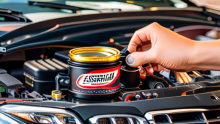- Log in to post comments

Proper car maintenance is essential for keeping your vehicle running smoothly and efficiently. By following a regular maintenance schedule, you can help to extend the lifespan of your car and avoid costly repairs down the road. In this guide, we will cover a range of essential car maintenance services that every car owner should be familiar with.
Oil Changes
Replacing the oil and oil filter on a regular basis is crucial for maintaining the health of your car's engine. The oil lubricates the moving parts of the engine, preventing friction and overheating. Over time, oil breaks down and can become contaminated with dirt and debris, reducing its effectiveness. Changing your oil every 3,000-5,000 miles, or every three to six months, helps ensure that your engine runs smoothly and can prevent costly damage.
During an oil change, the oil filter is also replaced to remove any impurities from the oil. This service usually takes about 30 minutes and can be performed at most auto service centers. Regular oil changes can help enhance fuel efficiency, boost performance, and increase engine lifespan.
Tire Rotations
Regular tire rotations are important for extending the lifespan of your tires and improving your vehicle's performance. Tires wear unevenly due to factors such as weight distribution, driving habits, and road conditions. By rotating your tires every 6,000-8,000 miles, you can ensure more even wear across all four tires.
A tire rotation typically involves switching the front tires with the back tires and possibly switching the sides as well. This helps maintain traction, improves handling, and reduces the likelihood of tire blowouts. Proper tire maintenance, including rotations and regular inflation checks, contributes to safer driving conditions and can enhance fuel economy.
Brake Inspections
Your brakes are one of the most important safety features of your car, making regular inspections essential. Brake inspections should be performed every 12,000-15,000 miles to check for wear and tear on components such as brake pads, rotors, and fluid levels.
During an inspection, a mechanic will assess the condition of your brake pads, which may need replacement if they are worn down to 1/8 inch thick. They will also check the brake fluid for contamination and ensure that the brake rotors are smooth and functioning properly. Staying proactive with brake maintenance can help avoid more serious issues, such as brake failure, which can lead to accidents.
Battery Maintenance
The battery is essential for starting your engine and powering your car's electrical systems. Regular battery maintenance can help extend its lifespan and ensure that your vehicle starts reliably. It is recommended to have your battery checked every 12 months or 12,000 miles.
Battery maintenance includes cleaning the terminals to prevent corrosion, checking fluid levels, and performing a load test to ensure the battery can hold a charge. If your battery is over three years old, it’s especially important to keep an eye on its performance. A well-maintained battery can help you avoid being stranded due to a dead battery, especially in extreme weather conditions.
Transmission Service
The transmission is responsible for transferring power from your engine to the wheels. Proper transmission maintenance is crucial for keeping your car running efficiently. This service typically involves changing the transmission fluid and filter, which helps lubricate the transmission's moving parts and removes contaminants.
It is generally recommended to have your transmission serviced every 30,000-60,000 miles, depending on your vehicle's make and model. Signs of transmission issues include slipping gears, strange noises, or delayed shifting. Addressing these issues early can save you from expensive repairs or transmission replacement.
Coolant Flush
The coolant system helps regulate your car's engine temperature. Over time, coolant can become contaminated with debris and lose its effectiveness. Regularly flushing the coolant and replacing it helps prevent overheating and protects engine components from corrosion.
It is generally recommended to flush the coolant every 30,000-50,000 miles. During this service, old coolant is removed, and new coolant is added to the system. This process not only helps maintain optimal engine temperature but also ensures that your cooling system is functioning efficiently, which is vital for the longevity of your engine.
Conclusion
By staying on top of your car's maintenance schedule, you can help to ensure that it remains safe and reliable for years to come. Consult your car's owner's manual for specific maintenance recommendations, and don’t hesitate to ask a mechanic if you have any questions. Regular car maintenance may require a bit of time and money upfront, but it is a small investment compared to the cost of major repairs or even having to replace your car entirely.